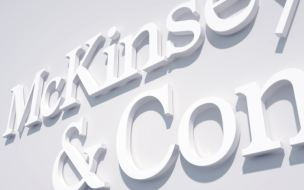92 percent of the 2016’s HEC Paris MBA class accepted job offers within three months of graduation. Graduates secured employment at many top, multinational companies, such as Amazon, A.T. Kearney, GE, Google, HSBC, McKinsey & Company, and PwC. On average, HEC Paris MBA grads doubled their pre-MBA salaries.
But, in recent years, the career motivations of MBA students have changed. Now, more than ever before, a millennial generation of MBA students are looking to make a social impact in their careers – to earn more money, but to give back at the same time.
According to a Deloitte survey of 8,000 young professionals across 30 countries worldwide, millennials see the workplace as the place they’re most able to make an impact and work to alleviate society’s greatest challenges.
How are HEC Paris MBAs making a social impact? BusinessBecause spoke to two recent grads to find out.
Emilie Flanagan, MBA ’14
After an MBA at HEC Paris, Emilie left a consulting job at KPMG Singapore, took the leap, and started her own business. As founder and managing director of Obi Partners, she’s combatting the environmental impact of the palm oil industry in Southeast Asia.
Obi Partners works to transform the waste generated by palm oil production into high-value products like biochemicals, clean water, and renewable electricity used by local farming communities or sold to the Indonesian or Malaysian national grid. To date, Emilie has helped source over $25 million in capital for new waste-to-value projects.
How did the idea to start up Obi Partners come about?
I have always been passionate about the energy sector, specifically renewable energy. At KPMG Singapore, I was working on a lot of palm oil sector proposals focused on Indonesia. Being in Southeast Asia, you are continuously exposed to the palm oil sector and its unfortunate consequences on the environment. Almost yearly, Singapore gets drowned in haze from the mass deforestation that happens in Indonesia.
With the development of new, sustainable technologies, my partners and I began investigating what could be developed to prevent the palm oil sector from causing such great environmental damages while allowing agribusinesses to generate greater economic and social value at their mills.
What’s happening currently with your business?
We are actively talking to various mill groups and have a robust pipeline of potential projects. We are also a member of the Climate Technology Change Network, which is the operational arm of the United Nations Framework Convention on Climate Change (UNFCCC).
Would you be where you are today without the HEC Paris MBA?
I don't think I would have had the confidence to start my own business without going through an MBA. I wanted a business degree with a European business perspective and, as HEC Paris is the one of the best business schools in Europe, it was my top choice and I was very excited to be able to attend.
The MBA allowed me to refocus my career on the energy sector and greatly develop my finance skills. The people I met, not only became friends for life, but also a vast international network of business professionals that I can rely on and do business with.
Emily Groffman, MBA '15
Emily left her job at Apple and relocated from the US to pursue a full-time MBA at HEC Paris. There, she became president of the school’s Net Impact chapter. After graduation, she triple-jumped into the social impact space – changing industry, role, and location – to land a consulting job for a development NGO in Haiti.
Now, she works for The Global Fund to Fight AIDS, Tuberculosis and Malaria in Geneva, Switzerland. The Global Fund raises and distributes billions of dollars in funds each year to national health programs worldwide. Emily joined to help launch the Global Fund’s new procurement platform – wambo.org – which helps governments and NGOs access life-saving medicines and other health products at affordable rates.
What inspired you to work in social enterprise? What advice do you have for MBA students looking to do the same?
From a young age, I have been interested in pursuing a career that would have impact beyond personal wealth. I've also always loved traveling. Put those two things together, and a career in international development made sense for me!
To any students who are passionate about having a social impact, I would simply say, go for it. You don't have to work for a small struggling nonprofit with low wages. You can work for a large development organization with good benefits.
You can also start your own social enterprise or organization. Or, you can go on and work in a corporation as an intrapreneur, changing things from the inside. Take the time during the MBA to think about what you really want to achieve in your life, then do it!
How are you applying what you learned in your MBA to your current role?
I work in the sourcing division for the Global Fund on a project that helps governments save costs when procuring health products. It also brings more visibility and transparency into the market, which helps procurement units make better, more informed decisions when deciding which products to order.
At HEC Paris, I specialized in Advanced Management in Global Enterprises. The backbone of the course focused on soft skills – some of the most important skills to have for my current role. Your thoughts and insights matter a whole lot less if you don't know how to express them.
Would you be where you are today without the HEC Paris MBA?
Almost definitely not! Immediately after the MBA, I worked as a health strategy consultant for a development NGO working with the government in Haiti. Recruiters from this organization came to HEC Paris, I stayed in touch with them, and eventually was placed into that position. This was a necessary step to my current role.
I molded the MBA into an experience that matched my needs, and I'm thankful that the relatively small class size allowed for this. I took a leadership role in the opportunities that interested me most and HEC Paris’ professors made an effort to include case studies introducing us to a variety of industries.
RECAPTHA :
98
79
c8
e7









